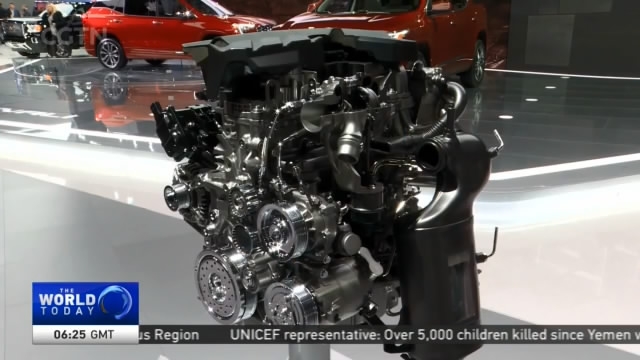
15:10, 17-Jan-2018
Detroit Auto Show: Carmakers challenged by diverging environmental policies

At the Detroit Auto Show, carmakers are showing off their latest gas and electric models. It reflects an industry trying to face the challenges posed by some governments moving in different directions when it comes to emissions policies. So how is the car industry responding to the world's two largest car markets, China and the US. CGTN's Nick Harper reports from Detroit.
The U.S. auto industry is moving forward though its direction remains unclear.
The final destination likely includes fully electric vehicles.
But gas-guzzling pickup trucks and SUV's still remain among the best U.S. sellers.
It's a balancing act, with electric models sitting alongside traditional combustion engine vehicles.
STEPHANIE BRINLEY IHS MARKIT "Fuel emissions issues are not going away anytime soon, they're just getting more and more strict. You've lots of different governments around the world considering banning fossil fuel vehicles. Directionally a lot of governments have said that's where they want to go, and automakers need to respond to that."
To curb emissions, China is among a number of governments considering a ban on gas and diesel-powered cars.
To help, they're offering subsidies for companies to make, and consumers to buy, electric vehicles.
Meantime, American lawmakers are considering scrapping similar electric car credits - and that worries carmakers.
CHRISTIAN MEUNIER GLOBAL DIVISION VICE PRESIDENT, INFINITI "That would be a concern because that would limit the expansion of the electric car quite significantly, when the electric car is probably the future, and you don't want the United States to be well behind the trend. It would be sad to see China become the leader by far and the U.S. not stepping up towards electrification."
NICK HARPER DETROIT "But that electrification is a chicken and egg problem. Some governments may want more electric, but carmakers say they need more infrastructure - things like charging stations. At the moment, there's simply not enough."
CARL ZIPFEL EXTERIOR DESIGN MANAGER, GMC "Certainly infrastructure plays a key part, whether it's fuel cells, electrification, you've got to have that in place. So there's got to be a good cooperation working between the OEMs and the government agencies to make that sure that's all happening."
With differing government policies, there's potentially a bumpy road ahead for the global car industry as it tries to navigate environmental and technological demands. Nick Harper, CGTN, Detroit.

SITEMAP
Copyright © 2018 CGTN. Beijing ICP prepared NO.16065310-3
Copyright © 2018 CGTN. Beijing ICP prepared NO.16065310-3